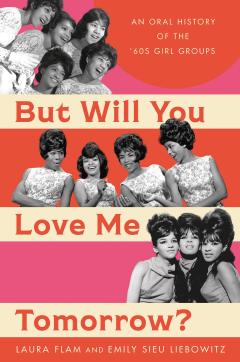
- Title
- But Will You Love Me Tomorrow
- An Aural History of the '60s Girl Groups
- Author
- Laura Flam, Emily Sieu Liebowitz
- Format
- Audio
This book is almost 100% constructed from excerpts from first person interviews with a wide cast of characters from the industry and era, all meticulously edited to produce a readable, engaging, well-rounded, sometimes contradictory story. It’s a brilliant structure and I can’t imagine how much work went into editing all this together so cleanly. The authors let their subject speak, interjecting only a sentence or two here and there for necessary context. And through this tight scrapbook of excerpts, we see a full story emerge as characters reinforce one another. And we sometimes see them disagree, on interpretation and even on fact. The authors let these disagreements stand without comment. I find this revealing in a way that writing about these people would not be. It is wonderful.
Early on in the book, music exec Renee Pappas makes a point that I found fascinating:
There came a time, right after World War II, where there were Black radio stations to play Black music. But once you had a transistor radio, you could listen to it if Mom and Dad were listening to, I don’t know, whoever… Bing Crosby or somebody. Once transistor radios came into fashion, and kids could have their own music—rather than being tied to whatever the parents had—they started listening to the Black radio stations.
There’s this idea that the transistor radio, more than anything, is responsible for the youth-fueled rapidly evolving trajectory of rock music. In a sense it brought counter-culture into the mainstream primarily because parents could no longer control their children. I like this. This idea that discovery, creativity, and culture-mixing is what kids want, if only stodgy authority figures would get out of the way.
These ’60s girl groups were primarily young black women (often children), so it was no surprise that a strong undercurrent in this whole story is cultural and financial theft. I wish I could say it has a redemptive ending.
But despite that, the voices of these vibrant women come through as clearly in this book as they do in their genre-defining art. While there is darkness here (Murderer, rapist, and sociopath Phil Spector plays a major role for instance) there is also so much joy. These “girls” made music that has been there, in the background pastiche and also literal background, all my life. It was fun and exciting to learn more about them.
